Alabama politicians, groups react to Supreme Court decision on Donald Trump’s travel ban
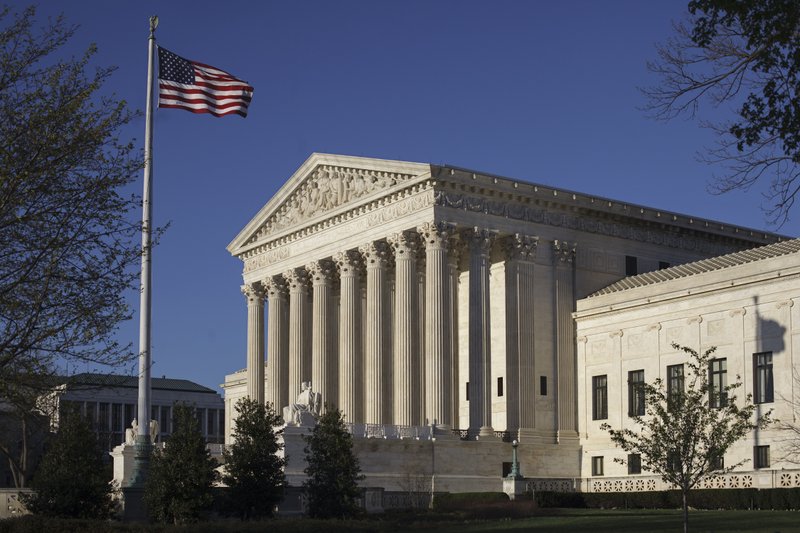
The Supreme Court of the United States ruled in favor of the Trump Administration’s travel ban, which prohibits travel from seven countries: Libya, Syria, North Korea, Iran, Somalia, Yemen and Venezuela. In a 5-4 decision, the court reversed an injunction that had — until December 2017 — prevented the Trump administration from using the Travel Ban 3.0 as a basis for denying visas to foreign nationals from the affected countries. Here are their reactions (in order received/seen online): Terry Lathan | Chairman of the Alabama Republican Party (ALGOP) The Constitution has clearly given a president the authority to implement executive orders. The travel ban pertaining to several countries was in that scope. This is not a policy on discrimination- it is a policy on the security of our nation. Chief Justice John Roberts was correct when he authored that the ruling was ‘squarely within the scope of presidential authority’ under our federal laws. We applaud the Supreme Court’s decision on this matter. Alabama 3rd District U.S. Rep. Mike Rogers: I was thrilled today to see the Supreme Court uphold President Trump’s travel ban. It is a huge win for the safety of the American people and our national security. President Trump is exactly right that we must fully vet people from these countries before even considering to allow them into the United States. Keeping Americans safe is one of the highest duties of the government and this was absolutely the right decision. Alabama 5th District U.S. Rep. Mo Brooks: I applaud the Supreme Court for finding that President Trump has authority to take such actions as are necessary to protect American lives from terrorism risks. America is safer as a result. The President’s legal authority on immigration and national security in this instance is clear. The liberal, judicially activist 9th Circuit, the most error-prone and reversed circuit court of appeal, unnecessarily put American lives at risk when it undermined the President’s Constitutional authority to protect Americans. I am pleased the Supreme Court overturned the 9th Circuit’s liberal, activist, and unconstitutional overreach. I fully supported President Trump when he issued the Travel Order Proclamation and I fully support the President’s continued actions to protect American lives. Today’s decision is a win for the Rule of Law. Alabama 7th District U.S. Rep. Terri Sewell: Today’s Supreme Court ruling upholding the Muslim travel ban takes our country in the wrong direction. America was built on the promise of freedom and opportunity for immigrants of all backgrounds, regardless of religion. Trump’s own statements on the purpose of his Muslim ban are evidence of the religious discrimination that his Muslim ban is founded on. While the President has authority to protect our national security, promoting blatant religious discrimination only undermines our interests abroad and our security at home. Trump’s Muslim ban does not make our country safer. Instead, it weakens our fight against terror by handing extremists a tool for recruitment and alienating Muslim partners around the globe. Additionally, the ban robs our nation of the economic input of immigrants, who are business owners, community leaders, students, and workers in our communities. Policies that discourage foreign investments in and partnerships with our country should be rejected by all who care about the long-term standing of the United States as a global leader. It is time for this Congress to hold the Trump Administration accountable for its dangerous, anti-family, anti-immigrant policies. CAIR-Alabama | Executive Director Khaula Hadeed Today’s decision deeply impacts Muslim communities and communities of color. This is not the first time the Court has been wrong on a decision. In Korematsu the Court permitted the incarceration of thousands of people based on their Japanese ancestry. In this case, Trump set out to ban Muslims from entering the country and the Court permitted him to do so. This decision empowers the president and future administrations to discriminate on the basis of religion. Randall Woodfin | Mayor of Birmingham America was founded by immigrants. It was built by immigrants. Yet the Supreme Court’s travel ban ruling undermines an entire group of people based on their religious beliefs. This is not who we are. America was built on the idea that people from all walks of life could come together and live in harmony. President Trump’s statements over the past few years demonstrate purposeful intent to deny our Muslim brothers and sisters the rights enjoyed by everyone within our borders. Birmingham taught the world the meaning of equality and tolerance. This is not it.
Alabama joins 15-state coalition in amicus brief supporting Donald Trump’s travel ban
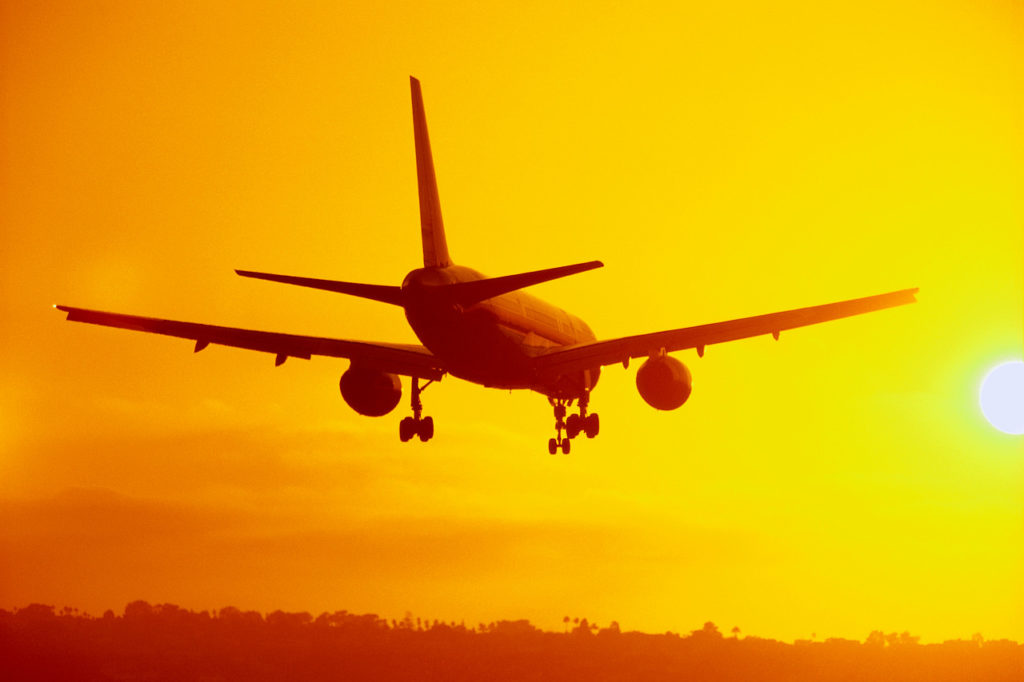
A team of state attorneys general submitted an amicus brief to the U.S. Supreme Court on Thursday in support of the Trump administration’s efforts to restrict travel to the United States by providing a 90-day delay of travelers entering America from Iran, Libya, Somalia, Sudan, Syria and Yemen due to national security concerns regarding those countries. Alabama Attorney General Steve Marshall joined 15 other states in the brief the Court to uphold the travel ban to protect American citizens from terrorism. “The President is rightfully exercising his legal authority to restrict the entry of those who may endanger the safety and security of Americans,” said Marshall. “The restricted countries have a strong record of violent acts and terrorism, and it is vital and appropriate that the President’s provisions stand to properly vet travelers from these areas for the protection of our citizens.” The brief relates to an executive order Trump signed March 6, a revision to an earlier travel ban he signed January 27, a week into his presidency. Federal judges subsequently prevented both versions from being fully implemented, dealing a major legal setback to the new administration’s immigration policy. The Trump administration appealed the injunctions to the Supreme Court, which allowed a limited version of the ban to take effect and will hear full arguments in October. Thursday’s amicus brief was filed by the State of Texas and joined by Alabama, Arizona, Arkansas, Florida, Kansas, Louisiana, Missouri, North Dakota, Ohio, Oklahoma, South Carolina, South Dakota, Tennessee, and West Virginia, along with Gov. Phil Bryant of Mississippi.
Donald Trump in Paris: The curious case of his friend Jim

For all things Paris, President Donald Trump’s go-to guy is Jim. The way Trump tells it — Jim is a friend who loves Paris and used to visit every year. Yet when Trump travels to the city Thursday for his first time as president, it’s unlikely that Jim will tag along. Jim doesn’t go to Paris anymore. Trump says that’s because the city has been infiltrated by foreign extremists. Whether Jim exists is unclear. Trump has never given his last name. The White House has not responded to a request for comment about who Jim is or whether he will be on the trip. Trump repeatedly talked about the enigmatic Jim while on the campaign trail, but his friend didn’t receive widespread attention until Trump became president. For Trump, Jim’s story serves as a cautionary tale — a warning that even a place as lovely as Paris can be ruined if leaders are complacent about terrorism. Jim’s biggest moment in the spotlight was during a high-profile Trump speech in February at the Conservative Political Action Conference in Maryland. Trump explained that Jim “loves the City of Lights, he loves Paris. For years, every year during the summer, he would go to Paris. It was automatic, with his wife and his family.” Trump one day asked Jim: “How’s Paris doing?” “’Paris?” Jim replied, as relayed by Trump. “‘I don’t go there anymore. Paris is no longer Paris.’” The mayor of Paris, Anne Hidalgo, responded by tweeting a photo of herself with Mickey and Minnie Mouse inviting Trump “and his friend Jim” to France to “celebrate the dynamism and the spirit of openness of #Paris.” France’s then-Foreign Minister Jean-Marc Ayrault also took to Twitter, noting that 3.5 million American tourists had visited France last year. The Jim story highlights differences on immigration between Trump and major European leaders, including Trump’s host in Paris, French President Emmanuel Macron. Trump has put immigration at the core of his anti-terrorism strategy. He proposed a Muslim ban during the campaign and is fighting in the courts to temporarily bar travelers from six Muslim-majority nations as well as refugees. Macron is an outspoken critic of discriminatory policies against France’s Muslim population. He favors strong external European Union borders and he’s also called for a united European policy on immigration so that countries like Greece are not disproportionately affected by the influx of refugees. Trump believes European policies fall short of any credible efforts to protect the public. He has vowed to push forward with a plan to build a wall along America’s southern border with Mexico and he advocates for “extreme vetting” to “keep terrorists out.” Trump never endorsed Macron’s election opponent, far-right candidate Marine Le Pen, but in an interview with The Associated Press, he noted that terrorist attacks in France would “probably help” her win since “she’s the strongest on borders and she’s the strongest on what’s been going on in France.” Trump has criticized several European leaders, accusing them of lax counterterrorism policies. He lashed out at London Mayor Sadiq Khan after an attack on London Bridge last month. In a February speech, Trump denounced Sweden’s policies and talked about “what’s happening last night in Sweden.” Swedish officials sought clarification because there were no known attacks in their country that night. Trump took to Twitter to explain: “My statement as to what’s happening in Sweden was in reference to a story that was broadcast on @FoxNews concerning immigrants & Sweden.” Republished with permission of The Associated Press.
Travel ban judges scrutinize Donald Trump’s Muslim statements
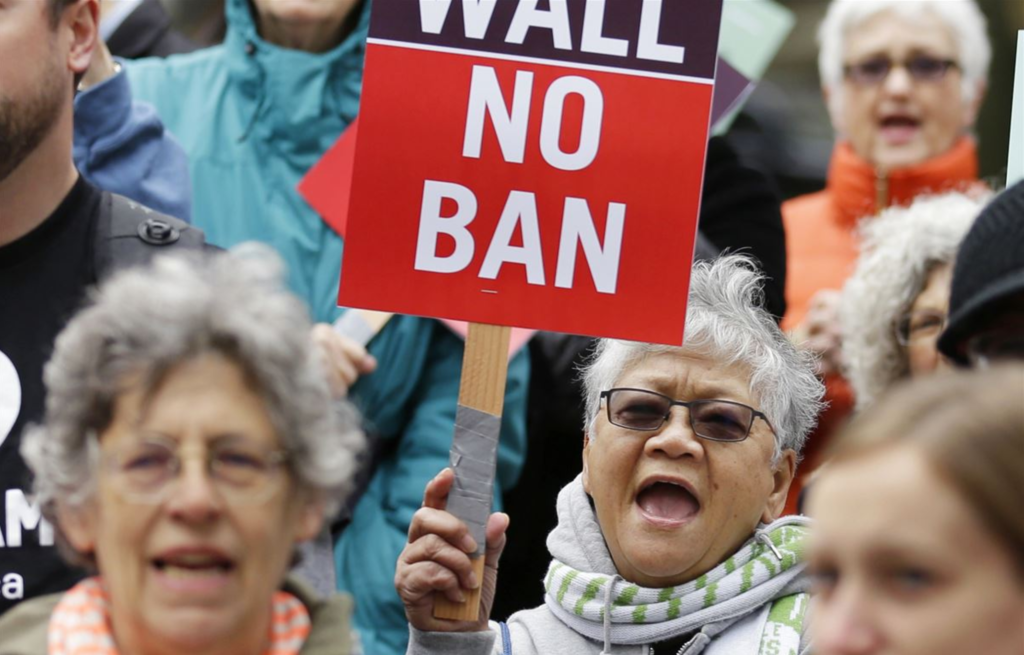
Federal judges on Monday peppered a lawyer for President Donald Trump with questions about whether the administration’s travel ban discriminates against Muslims and zeroed in on the president’s campaign statements, the second time in a week the rhetoric has faced judicial scrutiny. Acting Solicitor General Jeffrey Wall, defending the travel ban, told the three-judge panel of the 9th U.S. Circuit Court of Appeals that the executive order should be reinstated because it falls well within the president’s authority. “No one has ever attempted to set aside a law that is neutral on its face and neutral in its operation on the basis of largely campaign trail comments made by a private citizen running for office,” he said. Further, Wall said the president had backed off the comments he made during the campaign, clarifying that “what he was talking about was Islamic terrorist groups and the countries that sponsor or shelter them.” Neal Katyal, who represented Hawaii, a plaintiff in the lawsuit, expressed disbelief at that argument and said Trump had repeatedly spoken of a Muslim ban during the presidential campaign and after. “This is a repeated pattern of the president,” Katyal said. The 9th Circuit panel was hearing arguments over Hawaii’s lawsuit challenging the travel ban, which would suspend the nation’s refugee program and temporarily bar new visas for citizens of Iran, Libya, Somalia, Sudan, Syria and Yemen. The judges will decide whether to uphold a Hawaii judge’s decision in March that blocked the ban. Last week, judges on the 4th Circuit Court of Appeals heard arguments over whether to affirm a Maryland judge’s decision putting the ban on ice. They also questioned whether they could consider Trump’s campaign statements, with one judge asking if there was anything other than “willful blindness” that would prevent them from doing so. Dozens of advocates for refugees and immigrants rallied outside the federal courthouse in Seattle, some carrying “No Ban, No Wall” signs. Wall’s insistence that the travel ban should be upheld because it is “neutral,” without reference to Islam, drew pointed questions from Judge Richard Paez. An executive order issued by President Franklin Roosevelt that led to the internment of 110,000 Japanese-Americans during World War II similarly was couched as a necessity for national security and made no reference to residents of Japanese heritage, Paez noted. The U.S. Supreme Court upheld that executive order in a challenge brought by California resident Fred Korematsu. The ruling is now widely considered regrettable. “Would the Korematsu executive order pass muster under your test today?” Paez grilled Wall. “No, Judge Paez,” he answered “Why not? ‘Facially legitimate’ – that’s all you say!” Paez said. “You emphasize ‘facially legitimate.’” “I want to be very clear about this,” Wall said solemnly. “This case is not Korematsu, and if it were I wouldn’t be standing here and the United States would not be defending it.” Wall went on to argue that unlike the Korematsu case, Trump’s executive order probably wouldn’t be questioned but for the statements he made as a candidate. Paez also questioned Katyal about Trump’s statements, calling them “profound.” But the judge wondered whether Trump is forever forbidden from adopting an executive order along the lines of his travel ban. Katyal said no, and suggested the president could begin by repudiating his earlier statements or by working with Congress. “If you rule for him, you defer to the president in a way that history teaches us is very dangerous,” Katyal said. Monday’s arguments marked the second time Trump’s efforts to restrict immigration from certain Muslim-majority nations have reached the San Francisco-based 9th Circuit. After Trump issued his initial travel ban on a Friday in late January, bringing chaos and protests to airports around the country, a Seattle judge blocked its enforcement nationwide – a decision that was unanimously upheld by a three-judge 9th Circuit panel. The president then rewrote his executive order, rather than appeal to the U.S. Supreme Court, and in March, U.S. District Judge Derrick Watson in Honolulu blocked the new version from taking effect, citing what he called “significant and unrebutted evidence of religious animus” in Trump’s campaign statements. “Again, in this court, the President claims a nearly limitless power to make immigration policy that is all but immune from judicial review,” Hawaii Attorney General Douglas Chin wrote to the 9th Circuit. “Again, he must be checked.” At his daily briefing, White House press secretary Sean Spicer expressed confidence that the executive order will be upheld by the appeals court. “The executive order is fully lawful and will be upheld. We fully believe that,” Spicer said. The travel ban cases are expected to reach the Supreme Court, but that would likely be cemented if the 4th and 9th Circuits reach differing conclusions about its legality. Because of how the courts chose to proceed, a full slate of 13 judges heard the 4th Circuit arguments last week, while just three, all appointees of President Bill Clinton, will consider the case in Seattle. With the possibility for myriad concurring or dissenting opinions, it could take the 4th Circuit longer to rule, noted Carl Tobias, a law professor at University of Richmond law school in Virginia. Republished with permission of The Associated Press.
Appeals court to weigh challenge to revised Donald Trump travel ban
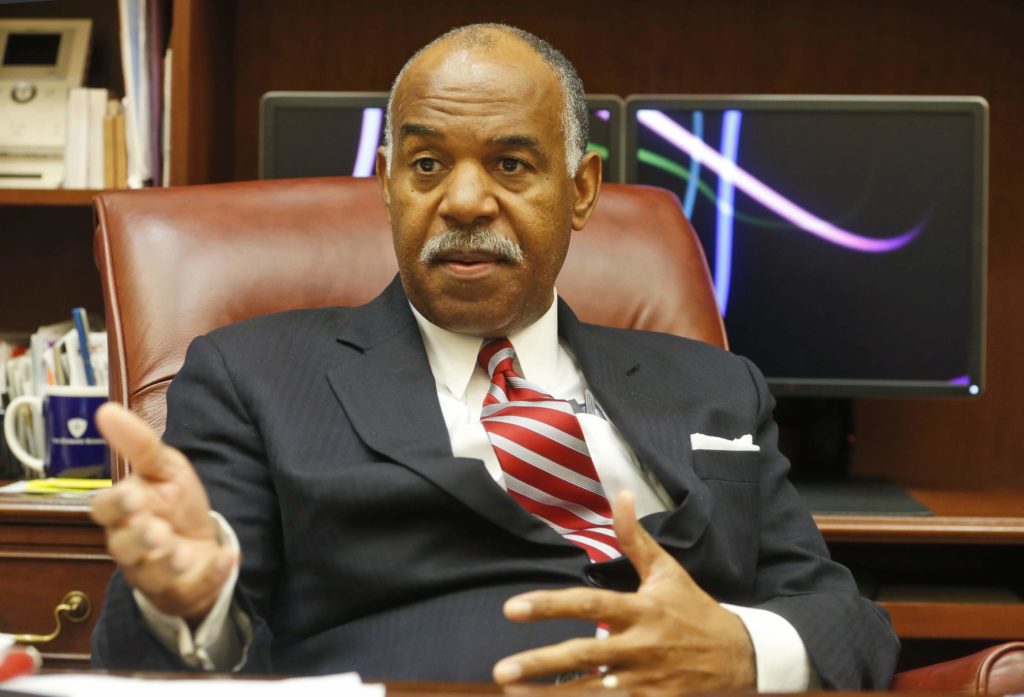
After a series of stinging legal defeats, President Donald Trump‘s administration hopes to convince a federal appeals court that his travel ban targeting six-Muslim majority countries is motivated by national security, not religion. The 4th U.S. Circuit Court of Appeals on Monday will examine a ruling that blocks the administration from temporarily barring new visas for citizens of Iran, Libya, Somalia, Sudan, Syria and Yemen. It’s the first time an appeals court will hear arguments on the revised travel ban, which is likely destined for the U.S. Supreme Court. Pointing to the Republican’s promises on the campaign trail to bar Muslims from entering the country, a federal judge in Maryland found in March that the policy appeared to be driven primarily by religious animus. Attorneys for the U.S. Justice Department say the court shouldn’t rely on Trump’s statements, but on the text of the policy, which they say is necessary to protect the country from terrorism. The banned countries represent just a fraction of the predominantly Muslim countries worldwide, they note. “The court should have focused on official acts, not perceived subjective motivations,” the attorneys say in court documents. The American Civil Liberties Union and National Immigration Law Center say Trump wants the courts to “blind themselves to the ample, public, and uncontested evidence” that the policy targets Muslims. “The basic question in this case is whether the mountain of evidence that exists as to the improper motive is going to be looked at by this court or swept under the rug,” said Omar Jadwat, director of the ACLU’s Immigrants’ Rights Project, who will argue the case Monday. In an extraordinary move signifying the importance of the case, the 4th Circuit decided to bypass the three-judge panel that typically first hears appeals and go straight to the full-court hearing. While the 4th Circuit was long considered one of the most conservative appeals courts in the country, it moved to the center under President Barack Obama, who appointed six of the 15 active judges. Now, nine judges are Democratic appointees and five judges are Republican appointees. Chief Judge Roger Gregory was given a recess appointment to the court by President Bill Clinton and was reappointed by President George W. Bush. It will likely be weeks before the 4th Circuit issues a decision. And even if the court sides with Trump, the travel ban will remain blocked unless the president also wins in another appeals court. A federal judge in Hawaii has also blocked the six-country travel ban as well as the freeze on the U.S. refugee program. A three-judge panel of the 9th U.S. Circuit Court of Appeals will meet next Monday to hear arguments in that case. Audio of the 2:30 p.m. EDT 4th Circuit will be broadcast live on C-SPAN. The court will also provide a link to the audio feed on its website. Republished with permission of The Associated Press.
Alabama announces its support for Donald Trump’s travel ban

The state of Alabama has thrown its support behind President Donald Trump‘s revised travel ban. On Monday, Alabama Attorney General Steven Marshall announced Alabama has joined 12 other states in filing an amicus brief in support of the Trump administration’s executive order temporarily restricting the admission of foreign nationals from six countries posing a security risk to the United States. The executive order was recently ruled unconstitutional by a federal court in Maryland, and the Trump administration has since appealed that ruling. Marshall says Trump has the legal authority to forbid foreign nationals from entering the U.S. “As president of the United States, Donald Trump has the legal authority to restrict entry into this country of any foreign national who may pose a risk to our safety and security,” observed Marshall. “It defies reason that the federal courts would seek to block the Commander in Chief from exercising his legal authority to preemptively safeguard Americans’ security. “In response, Alabama has sent a signal that we support the Trump administration’s executive order restricting entry of foreign nationals from six countries with the strongest record of terrorism: Iran, Libya, Somalia, Sudan, Syria and Yemen.” Alabama joined Texas, Arizona, Arkansas, Florida, Kansas, Louisiana, Mississippi, Montana, Oklahoma, South Carolina, South Dakota and West Virginia in filing an amicus brief Monday in support of the Trump administration.
Alabama’s senators back new Trump travel ban order
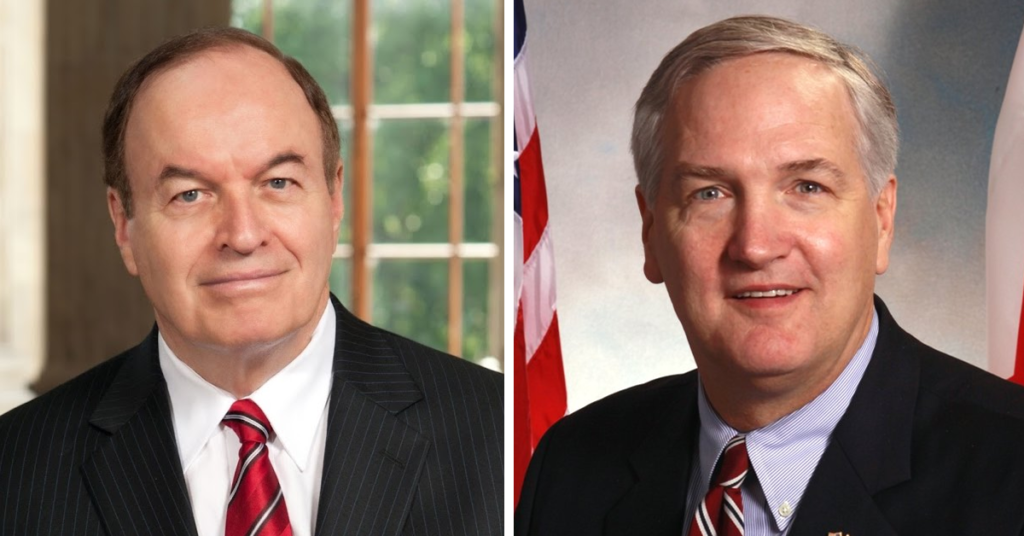
President Donald Trump’s new travel ban executive order received a warm reception from Alabama’s senators this week. U.S. Senators Richard Shelby and Luther Strange praised President Donald Trump‘s revised executive order, which bar new visas being issued to travelers from six countries — Iran, Syria, Somalia, Sudan, Yemen and Libya — for 90 days. Shelby says he’s been a long-time supporter of “a rigorous review of our vetting process” in regards to those allowed to enter the country. “The safety and security of the American people must be a top priority,” Shelby said in a statement. “I have always supported a rigorous review of our vetting process for those who cross our nation’s borders, and I am pleased that President Trump has appropriately modified his executive order to achieve this critical goal. I look forward to working with the Trump Administration and my colleagues in Congress to keep our citizens safe from any individual seeking to enter our nation and do us harm.” Alabama’s newest senator, who replaced Jeff Sessions, Luther Strange calls the new order “a proactive, comprehensive approach.” “Protecting Americans and securing the homeland are solemn obligations of the President,” weighed-in Strange. “The latest executive order takes a proactive, comprehensive approach, and gives us clarity about what steps are being taken to protect our communities. I applaud the President for taking action, and I look forward to working further on keeping America free from violent terrorists.” Trump signed the new order Monday weeks after his initial ban was put on hold by a federal judge and later upheld by an appeals court. The updated order clarifies the implementation of new U.S. visa and immigration protocol, provides resources for enhanced vetting of foreign nationals, and increases transparency in sharing these steps with the American people. It will go into effect on March 16th.
State, federal lawyers in court to argue Donald Trump travel ban
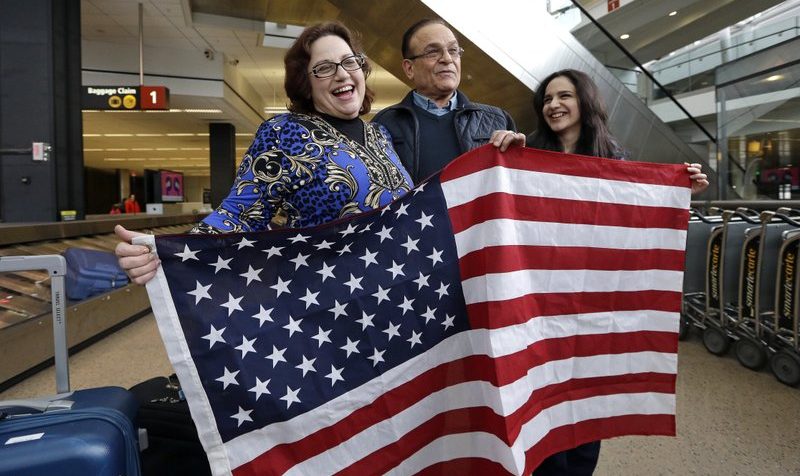
State and federal lawyers will argue before a panel of federal appellate court judges Tuesday in the pitched fight over President Donald Trump‘s travel and refugee ban that could reach the Supreme Court. The legal dispute involves two divergent views of the role of the executive branch and the court system. The federal government maintains the president alone has the power to decide who can enter or stay in the United States, while states suing Trump say his executive order is unconstitutional. Seattle U.S. District Judge James Robart, who on Friday temporarily blocked Trump’s order, has said a judge’s job is to ensure that an action taken by the government “comports with our country’s laws.” The Justice Department filed a new defense of Trump’s ban on travelers from seven predominantly Muslim nations as a federal appeals court weighs whether to restore the administration’s executive order. The lawyers said Monday the travel ban was a “lawful exercise” of the president’s authority to protect national security and said Robart’s order that put the policy on hold should be overruled. The filing with the San Francisco-based 9th U.S. Circuit Court of Appeals was the latest salvo in a high-stakes legal fight surrounding Trump’s order. Washington state, Minnesota and other states say the appellate court should allow a temporary restraining order blocking the travel ban to stand as their lawsuit moves through the legal system. The judges hearing the arguments — two Democrat-appointed judges and one Republican appointee — are from a randomly assigned panel. The appeals court over the weekend refused to immediately reinstate the ban, and lawyers for Washington and Minnesota argued anew on Monday that any resumption would “unleash chaos again,” separating families and stranding university students. The Justice Department responded that the president has clear authority to “suspend the entry of any class of aliens” to the U.S. in the name of national security. It said the travel ban, which temporarily suspends the country’s refugee program and immigration from seven countries with terrorism concerns, was intended “to permit an orderly review and revision of screening procedures to ensure that adequate standards are in place to protect against terrorist attacks.” The challengers of the ban were asking “courts to take the extraordinary step of second-guessing a formal national security judgment made by the president himself pursuant to broad grants of statutory authority,” the Justice Department wrote. The Seattle judge’s ruling triggered a Twitter rant by the president. On Sunday, Trump tweeted, “Just cannot believe a judge would put our country in such peril. If something happens blame him and court system. People pouring in. Bad!” Whatever the appeals court decides, either side could ask the Supreme Court to intervene. It could prove difficult, though, to find the necessary five votes at the high court to undo a lower court order; the Supreme Court has been at less than full strength since Justice Antonin Scalia‘s death a year ago. The last immigration case that reached the justices ended in a 4-4 tie. How and when a case might get to the Supreme Court is unclear. The travel ban itself is to expire in 90 days, meaning it could run its course before a higher court takes up the issue. Or the administration could change it in any number of ways that would keep the issue alive. After Robart’s ruling, the State Department quickly said people from the seven countries — Iran, Iraq, Libya, Somalia, Sudan, Syria and Yemen — could travel to the U.S. if they had valid visas. On Monday, a graduate student who had traveled to Libya with her 1-year-old son to visit her sick mother and attend her father’s funeral was back in Fort Collins, Colorado, after having been stopped in Jordan on her return trip. She was welcomed with flowers and balloons by her husband and other children. Syrian immigrant Mathyo Asali said he thought his life was “ruined” when he landed at Philadelphia International Airport on Jan. 28 only to be denied entry to the United States. Asali, who returned to Damascus, said he figured he’d be inducted into the Syrian military. He was back on U.S. soil Monday. “It’s really nice to know that there’s a lot of people supporting us,” Asali told Gov. Tom Wolf, who greeted the family at a relative’s house in Allentown. States challenging the ban have been joined by technology companies, who have said it makes it more difficult to recruit employees. National security officials under President Barack Obama have also come out against it. Republished with permission of the Associated Press.
Federal government seeks stay of immigration order

The Latest on a lawsuit by Washington and Minnesota seeking to halt President Donald Trump’s immigration ban (all times local): 7: 20 p.m. The White House says it will seek an emergency stay of a federal judge’s order that temporarily blocked President Donald Trump’s ban on people from seven predominantly Muslim countries. White House spokesman Sean Spicer said Trump’s executive order issued last week was “lawful and appropriate.” An initial statement said the judge’s order was “outrageous,” but it was later revised to remove that word. U.S. District Judge James Robart late Friday granted a temporary restraining order at the request of Washington state and Minnesota that’s effective nationwide. Washington Attorney General Bob Ferguson had said that Trump’s order is causing significant harm to residents and effectively mandates discrimination. Minnesota joined the suit this week. ___ 5:49 p.m. Minnesota Attorney General Lori Swanson says she supports measures to protect the security of the United States but also backs the Constitution. Swanson, a member of the Minnesota Democratic-Farmer-Labor Party, is reacting to a federal court ruling temporarily blocking President Donald Trump’s travel ban. She said in a statement Friday that she supports “strong measures to protect the security of the United States” but also supports “the bedrock of that security — namely, the Constitution of the United States.” U.S. District Judge James Robart granted a temporary restraining order Friday that Washington state and Minnesota requested. It halts Trump’s executive order banning travelers from seven predominantly Muslim countries and suspending the U.S. refugee program. ___ 4:35 p.m. Washington state’s attorney general says a federal court ruling temporarily blocking President Donald Trump’s travel ban shows nobody is above the law. U.S. District Judge James Robart granted a temporary restraining order Friday that Washington state and Minnesota requested. It halts Trump’s executive order banning travelers from seven predominantly Muslim countries and suspending the U.S. refugee program. Washington Attorney General Bob Ferguson said after the ruling that “the law is a powerful thing — it has the ability to hold everybody accountable to it, and that includes the president of the United States.” Ferguson said people from the affected countries can now apply for entry to the United States. The U.S. Department of Homeland Security had no immediate comment on the ruling. ___ 3:55 p.m. A federal judge in Seattle has temporarily blocked President Donald Trump’s ban on people from seven predominantly Muslim countries. U.S. District Judge James Robart granted a temporary restraining order Friday at the request of Washington state and Minnesota that’s effective nationwide. Trump signed an executive order last week that sparked protests across the country and confusion at airports as some travelers were detained. Lawyers for the U.S. government argued that the states don’t have standing to challenge the order and said Congress gave the president authority to make decisions on national security and admitting immigrants. Washington Attorney General Bob Ferguson had sued, saying the order is causing significant harm to residents and effectively mandates discrimination. Minnesota joined the suit this week. ___ 7:58 a.m. Washington state and Minnesota officials are asking a federal judge for an immediate nationwide halt to the implementation of portions of President Donald Trump’s immigration travel ban. Washington Attorney General Bob Ferguson says the state has a “profound interest” in protecting its citizens from the harms caused by what he called “the irrational discrimination” embodied in Trump’s order. A hearing is scheduled for Friday afternoon. Trump issued an executive order last week prohibiting people from seven predominantly Muslim countries from crossing U.S. borders. Washington and Minnesota want a temporary restraining order while the court considers their lawsuit, which says key sections of the order are unconstitutional. Ferguson says the order is causing significant harm to Washington residents and businesses. The Washington-based businesses of Amazon, Expedia and Microsoft support the state’s efforts to stop the order. Republished with permission of The Associated Press.
In a first, Emirati foreign minister defends Donald Trump visa ban

The United Arab Emirates‘ top diplomat on Wednesday came out in defense of President Donald Trump‘s order temporarily barring citizens from seven Muslim-majority countries from entering the United States. The comments by Sheikh Abdullah bin Zayed Al Nahyan, the Gulf federation’s foreign minister, could help bolster the administration’s assertion that the directive was not intended as a ban against Muslims. The UAE minister said the U.S. was within its rights to take what he said was a “sovereign decision” concerning immigration — the first such remarks in support of Trump’s move from the Gulf Arab region — and he voiced faith in the American administration’s assurances that the move was not based on religion. Sheikh Abdullah also noted that most of the world’s Muslim-majority countries were not covered by the order, which halts entry for 90 days to citizens of Iraq, Syria, Iran, Sudan, Libya, Somalia and Yemen. “This is a temporary ban and it will be revised in three months, so it is important that we put into consideration this point,” he said following talks with his Russian counterpart in the Emirati capital, Abu Dhabi. “Some of these countries that were on this list are countries that face structural problems,” he continued. “These countries should try to solve these issues … and these circumstances before trying to solve this issue with the United States.” The Emirates is one of the United States’ closest Arab allies. It is part of the U.S.-led coalition fighting the Islamic State group and hosts American troops and warplanes taking part in the anti-IS campaign. It is also home to a center backed by the U.S. that aims to counter extremist propaganda online. The seven-state federation prides itself on being a tolerant, forward-looking nation that also embraces its traditional Arab and Islamic heritage. The local population is dwarfed some four-to-one by foreign residents, many of whom are not Muslim. Trump made a point of speaking with the powerful Abu Dhabi crown prince, Sheikh Mohammed bin Zayed, and Saudi King Salman in his first calls to Arab allies this week. Sheikh Mohammed is the foreign minister’s brother and is likely to be the next Emirati president. America’s largest Arab export market, the Emirates also has commercial connections to the new U.S. president. Trump has lent his name to a soon-to-open golf course and real-estate project being developed in the Emirati city of Dubai, the Middle East’s commercial hub. The Abu Dhabi tourism office is a tenant of Trump Tower in New York. Sheikh Abdullah and Sergey Lavrov discussed a range of regional issues including the war in Syria during their meeting, which included Arab League Secretary-General Ahmed Aboul Gheit. Trump’s order also includes a suspension of refugee admissions for 120 days, and bans Syrian refugees from entering indefinitely. Lavrov expressed a willingness to engage with the new U.S. administration on the establishment of safe zones in Syria, something that Trump has expressed interest in creating. But he suggested more details were needed. “As I understand it, when the Americans are talking about safe zones, first of all they are interested in reducing the number of immigrants — especially through Syria — from going to the West,” he said. Republished with permission of The Associated Press.
Breaking silence, Barack Obama speaks out on Donald Trump immigrants order
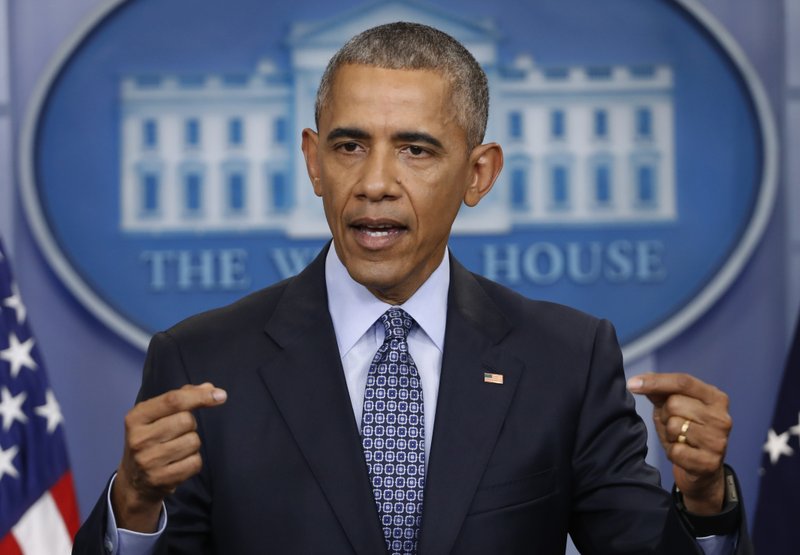
Former President Barack Obama praised protesters who amassed across the country in opposition to President Donald Trump‘s immigration orders, breaking his silence on political issues for the first time since leaving office. “The president fundamentally disagrees with the notion of discriminating against individuals because of their faith or religion,” Obama’s spokesman, Kevin Lewis, said. In his first statement on behalf of the former president, Lewis said Obama was “heartened” by the amount of engagement taking place in U.S. communities. Lewis, a former White House official, pointed out that Obama used his last official speech as president to talk about Americans’ responsibility to be “guardians of our democracy,” even in nonelection years. “Citizens exercising their constitutional right to assemble, organize and have their voices heard by their elected officials is exactly what we expect to see when American values are at stake,” Lewis said. Lewis didn’t specifically invoke Trump’s immigration order. But he rejected comparisons between Trump’s recent actions and Obama’s foreign policy decisions. Trump said he took cues from Obama by temporarily banning travel to the U.S. from citizens of seven countries that Obama’s administration identified as places of terrorism concern. But Obama’s designation related strictly to eligibility to enter the U.S. without a visa; he never considered a travel ban. Obama’s office also circulated excerpts from a speech the former president gave in November 2015, in which he called the idea of a ban on Muslims “shameful.” “That’s not American. That’s not who we are. We don’t have religious tests to our compassion,” Obama said in the aftermath of attacks in Paris that prompted calls for the U.S. to restrict Syrian refugees from entering the United States. Trump and the White House have vigorously disputed the notion that Trump’s order is a “Muslim ban.” Trump’s halts all refugee admissions for 120 days, suspends the Syrian refugee program indefinitely and also suspends entry to the U.S. from seven majority-Muslim countries for 90 days. But the White House has stressed that dozens of other Muslim-majority countries aren’t included. Lewis’ comments mark the first time Obama has weighed in on Trump’s actions since Obama left office on Jan. 20. In his final weeks as president, Obama said he planned to follow George W. Bush‘s example by giving his successor room to govern without being second-guessed. Yet Obama pointedly reserved the right to speak out if Trump violated what Obama called basic American values. He suggested a ban on Muslims or a move by Trump to deport immigrants brought to the U.S. illegally as children would cross that threshold. Republished with permission of The Associated Press.
Democratic oppo file on Jeff Sessions leaked months ago, WikiLeaks says
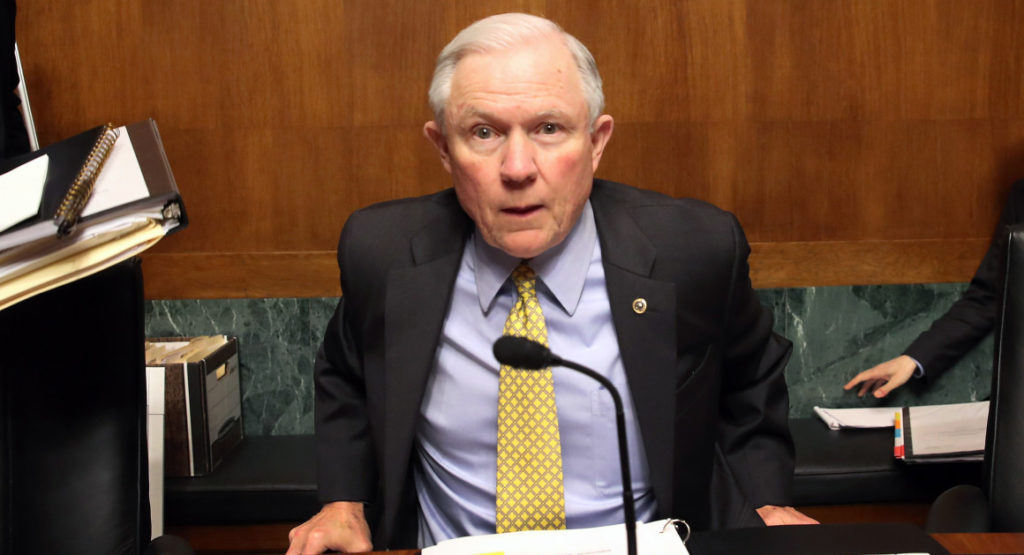
Democrats’ strategy to stonewall Alabama Sen. Jeff Session’s appointment to Donald Trump’s cabinet has been laid out for months, according to emails published by whistleblower site WikiLeaks. In May, an email between two Democratic Party staffers outlined the party’s “top hits” for Trump’s potential VP picks, including Sessions and fellow Sens. Bob Corker and Joni Ernst. None of those three “tier 1” politicians ended up being Trump’s running mate, though Sessions’ has been picked for Attorney General by the incoming administration. The staffer warns that Sessions’ document “contains the N-word,” previewing one of the lines of attack the party has used against the 20-year Senate veteran during the lead up to his confirmation hearings. Attached to the email are two documents combining to 85 pages cataloging Sessions’ comments on everything from foreign policy and the proposed Muslim ban, to women and racism. The “top hits” are split up into sections detailing why Sessions is “bad for Latinos,” “bad for African-American,” and “bad for women,” among many other groups. Given the contents of the document, Sessions’ confirmation hearings can be expected to include questions about the constitutionality of some of Trump’s comments, whether Sessions’ will enforce the Supreme Court’s ruling on same-sex marriage, and how he will treat states’ rights in regards to things such as marijuana legalization.

